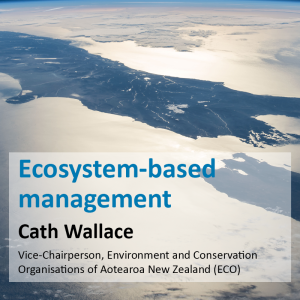Each day during the month of April, the Institute will feature one of the 30 ‘perspectives’ from the One Ocean report. These short articles include a diverse range of views regarding oceans management in New Zealand. Enjoy!
Today:
Ecosystem-based management
Oceans are vitally and dynamically connected to each other, the earth and the atmosphere, and these are foundations for society, culture and the economy. Attempts to manage impacts, activities, public access and private benefits regarding oceans are difficult. Some private uses of oceans are incompatible with other uses, and these can be damaging to the dynamics, health and functions of oceanic systems and ecosystems and to the broader public good.
Internationally, ecosystem-based management began in 2020. New Zealand needs to catch up – we are well behind international best practice. Climate change, damaging fishing, spreading alien species, pollution and marine mining all make ecosystem-based management essential.
Ecosystem-based management recognises that natural systems are closely connected but easily damaged and destabilised. It helps control our uses and impacts to keep the systems healthy, functioning and productive. Key principles for ecosystem-based management include information sufficiency requirements to understand impacts and ecosystem functions and relationships before decisions are made. There are many other essential facets of ecosystem-based management: considering cumulative impacts, regulating incompatible and damaging uses and using precautionary approaches, spatial management, science independent of industrial interests, responsive management and public participation.
The EEZ and Continental Shelf Act doesn’t achieve integrated ecosystem-based management. It preserves existing, largely extractive interests and fragmented management. It has not generated integrated precautionary and spatial management. Our challenge is to adopt proposals, such as Mike McGinnis’s, for an ocean health index, a public trust approach, independent public trust science and spatial-based, well-informed, integrated ecosystem management. To fail to do so is to fail the future.






















![20160906 McGuinness Institute - TacklingPovertyNZ Workshop – Far North Flyer [FINAL]](/wp-content/uploads/20160906-McGuinness-Institute-TacklingPovertyNZ-Workshop-%E2%80%93-Far-North-Flyer-FINAL-1-50x50.png)